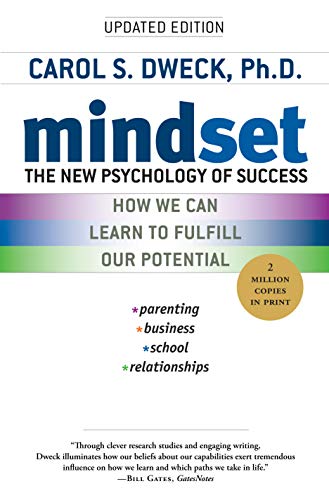Mindset: The New Psychology of Success by Carol S. Dweck Link to heading
Summary Link to heading
“Mindset: The New Psychology of Success” by Carol S. Dweck explores the concept of “mindsets,” explaining how our fundamental beliefs about our abilities and intelligence can impact our success, happiness, and even relationships. Dweck introduces two primary mindsets: the fixed mindset and the growth mindset. A fixed mindset is the belief that abilities are static and unchangeable, leading to a desire to appear smart and an aversion to failure. Conversely, a growth mindset embraces challenges and sees failures as opportunities to develop and improve abilities. Throughout the book, Dweck demonstrates how adopting a growth mindset can lead to personal and professional success.
Review Link to heading
The book has been widely praised for its transformative perspective on achievement and personal development. Dweck’s work is grounded in extensive research, making it a valuable resource for educators, business leaders, parents, and individuals seeking self-improvement. The clear distinction between fixed and growth mindsets provides readers with a practical framework for understanding and changing their own mindsets. Some critics, however, have pointed out that the book can be repetitive, as it reinforces its core themes across different scenarios and fields without offering a deeper dive into the nuances of mindset application.
Key Takeaways Link to heading
- Mindset Matters: Our beliefs about our abilities significantly influence our behavior and achievement. Embracing a growth mindset can lead to higher achievements and greater fulfillment.
- Learning from Failure: Failures should be viewed as opportunities for growth rather than as evidence of unchangeable incompetence.
- Importance of Effort: Success stems more from persistent effort and learning strategies than from innate talent or intelligence.
- Encouragement and Feedback: Providing specific praise for effort, strategy, and process encourages growth mindset behaviors, while praise focused on innate abilities can reinforce a fixed mindset.
- Lifelong Application: Mindsets can affect many areas of life, including education, business, sports, and personal relationships.
Recommendation Link to heading
“Mindset: The New Psychology of Success” is recommended for anyone interested in personal growth, self-improvement, or motivation. Educators and leaders may find it particularly useful for developing strategies to foster growth mindsets in students and teams. Parents might also benefit from insights on how to encourage a growth mindset in their children. The book’s clear and accessible writing makes it suitable for a broad audience, though those seeking in-depth scientific exploration may find the book more of a starting point than a comprehensive resource.
